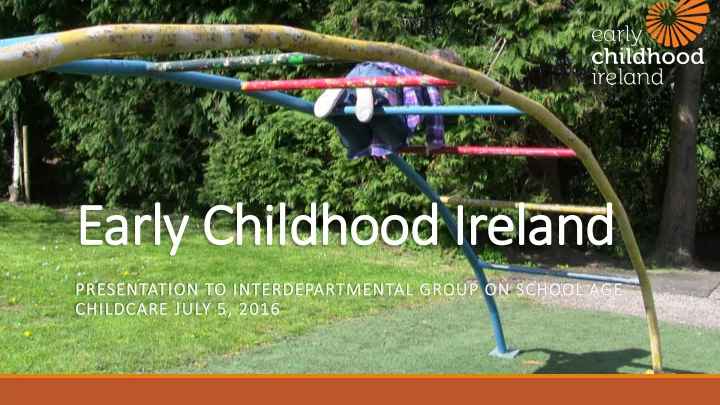

Early Childhood Ireland PRESENTAT ATION TO INTERDEPARTMENTAL GROUP ON SCHOOL AGE CHILDCARE JULY LY 5, 2016
Perspectives on School-Age Childcare
Principles to underpin local school age childcare expansion • Quality needs Investment • Build on existing provision that has a proven track record of quality delivery • Use the principle of Openness and Transparency, with invitations to tender being sent to existing operators in the first instance • Local experts, e.g. the CCC should be involved on selection panels
Audit of existing capacity What is it? Is it Afterschool or Out-of-School? After school care is just that – children stay afterschool. Out-of-school care involves a wrap round service - before school, after school and care during all school holidays. School transport is provided. Audit should also gather quality information Planning must then address: Who is it for? Who can we work with locally to address known gaps?
Request for Tender (example) Experience Engagement on quality programmes Mission statement Partnership with Parents Vision Blending into the school environment ECCE Experience Commitment to growth After School Experience Benefits to the school from this partnership Qualifications Proposed Financial Structure Inspection Reports
Consultation with parents EXPECTATIONS VS NEEDS EXPECTATIONS VS NEEDS Opening Times- services are required from Sibling interaction 7/7.30am and until 6pm Twice as many parents use after school care as Open during holidays use Before School Hot food Homework completed One school location being used by multiple 80 % of existing ‘afterschool’ parents would use schools a school subsidised model if it were available. 80% said they would prefer a choice to remain School pick up in a nonschool environment if the same subsidy applied(B Thornberry)
Consultation with parents Regulations to apply to this sector Continuity and security of care for their children. Children to mix with friends in their neighbourhood – not necessarily in their school. Brothers and sisters attending afterschool to be able to play together. Homework done and meals provided. Care at all times that schools are closed during mid-term and school holidays* but especially ad-hoc times (at short notice) like teacher training days, schools closed for elections, snow days etc. Must be affordable *84% of parents required care during summer holidays
Consultation with Children Consultation with Children Childrens views should inform the programme, e.g. the ‘rules’, the naming of the place or the design of session content; Evidence that children’s views are incorporated Research shows that children see school as work and formal, whereas ‘afterschool’ is fun with their friends. Children also see afterschool as a time when their voice is heard, and they have an input in the curriculum/program unlike the teacher-led environment in the am sessions (B Thornberry
Wise owl video 2 and 5 https://www.dropbox.com/sh/qywgg2moofxibzu/AAAnG3bC27BON7hu6IKHKm8da/Child re06-2016%2C%201%2040%2050%20p.m..mov?dl=0
Themes 1. Children’s Choices 2. Curriculum 3. Environment 4. Relationship with Community 5. Care & Development 6. Leadership & Management
1. Children’s choice For example: Facilitation of children by letting them help with younger children within mixed age settings; Allowing children participate in after school activities in school which may require multiple pick ups; Sometimes tension with parents choices re Homework- Middle Ground is usually managed by time and a Homework Policy; Often 2 spaces – 4-8 yrs .; 9- 12 yrs. Older children don’t want to be ‘minded’;
2. Curriculum Play & Recreation Access to outdoor play Age appropriate programmes and Roles- increasing with age Allowing for the promotion of mixed age settings and sibling interaction Inquiry Project based approach to Curriculum, thematic….Star Wars, Crime Scene Investigation Partners in Learning
Maria gaynor video- 9 th on dropbox
Crime Scene Investigators
Relationships and Community
Science - Exploring our World
3. Environments Access to outdoor areas and playgrounds Access to school Hall Naming often suggests the character of the setting- Chill zone, Club Comfortable furniture is important, rugs, cushions, couches Suitable toys and play equipment, e.g. Construction, Open ended materials, Karaoke, Dress Up/Role Play, Cooking, Participation in the community
4. Relationship with the Community For children in afterschool, their community is often their friends. They need to feel that their After School is their community, a place where they contribute and belong A space for children to come together and relax, be creative, decipher the information that they have accumulated throughout the day and socialise with their friends Example of a partnership with Local Youth Club in response to specific needs of older after school children. Negotiated access to indoor and outdoor space with the following sample timetable
5. Care & Development Food & Nutrition Physical Activity Health & Safety
6. Leadership & Management QUALITY TRAINING GOVERNANCE Initial Training Relationship with Schools/Local Organisation SACCI Polices & Procedures CPD Child Protection Health & Safety Inclusion/Diversity Children with Additional Needs
6. Leadership & Management RELATIONSHIP WITH SCHOOL/LOCAL STANDARDS ORGANISATION Contracts Developed in partnership SLA’s How will they be monitored? Quality commitments Linked to quality? Ethos Self Assessment Statements? Homework agreements
6. Leadership & Management - Sustainability Multiple Models Cets and TEC are offered; Not ASCC Price per hour – e.g. € 5 per hour in Kildare Need to access CCS during School Holidays Price per Day e.g. € 20 Kildare, € 15 Tipperary, Rural services may not have sufficient numbers € 21 Sligo(with collection), € 14 Monaghan, € 10- enrolled to support 2 staff members and € 20 Roscommon therefore a rural premium will be required Other partnership models, for services located Similarly, services in urban disadvantaged areas, within the school, is based on % of revenue particularly in DEIS areas, will need additional earned which is paid to the school resources Bus costs € 12-20k and average Insurance cost of Rents payable to schools vary from e.g., € 150 per € 1300. Depending on the number of schools month in Donegal to € 3000 per month in Dublin being serviced, more than one bus may be needed;
Next Steps Audit Consultation Partnership Partnership Applications between schools/local organisations and local operators Investment in Infrastructure, Grants for new equipment Standards Continued leadership by DCYA
Recommend
More recommend